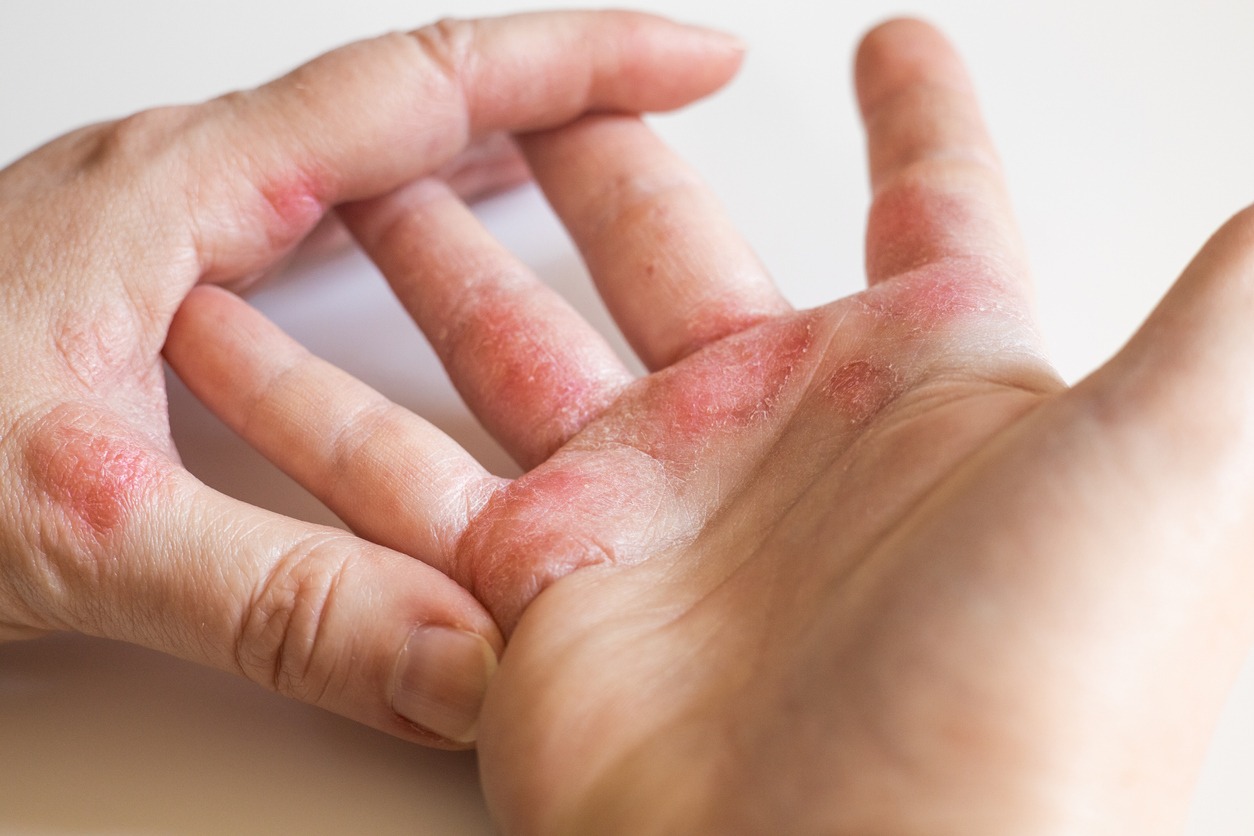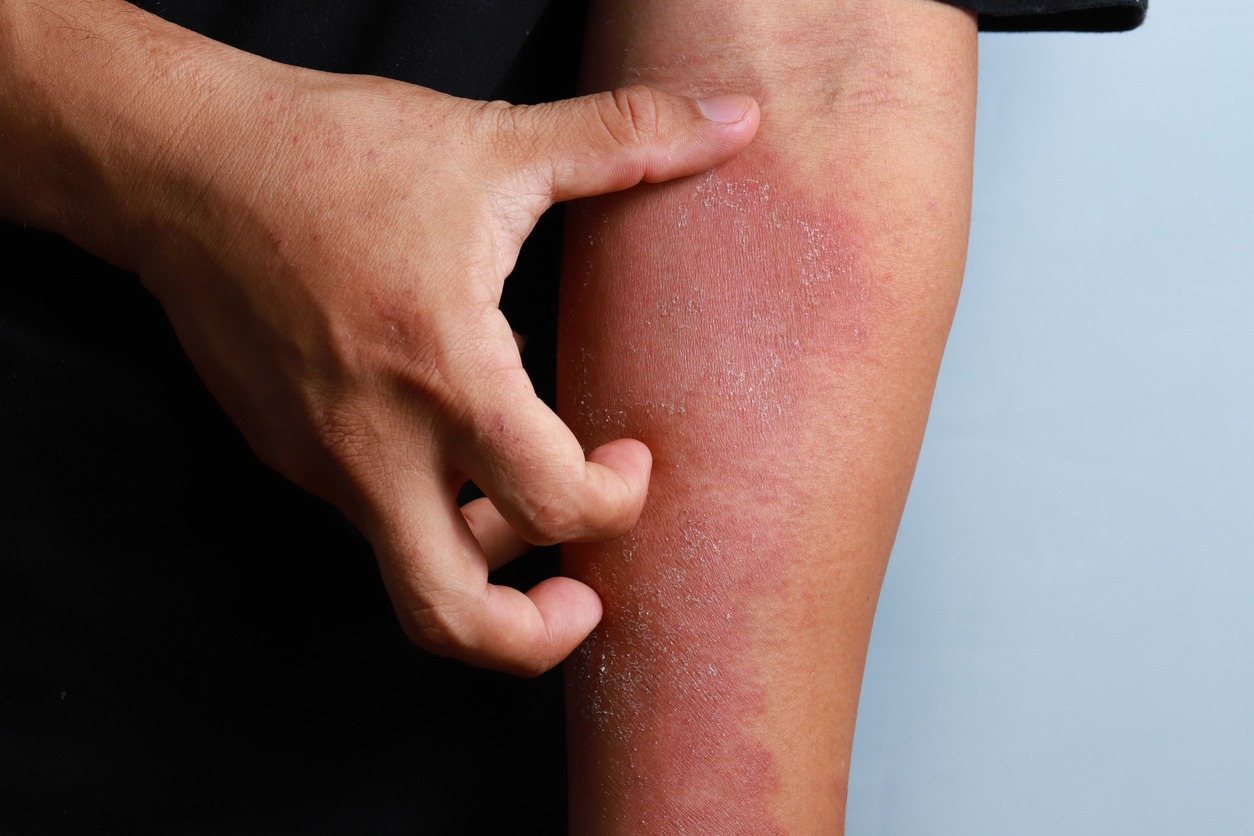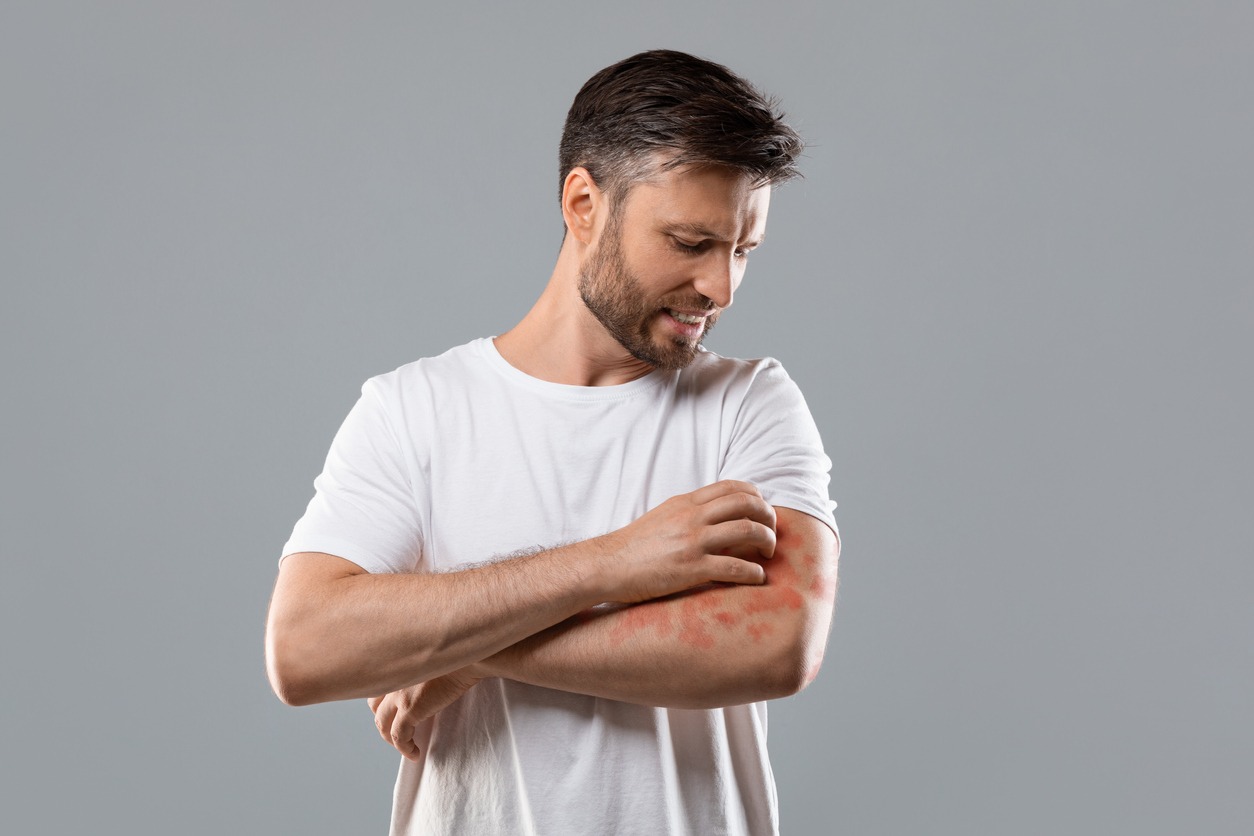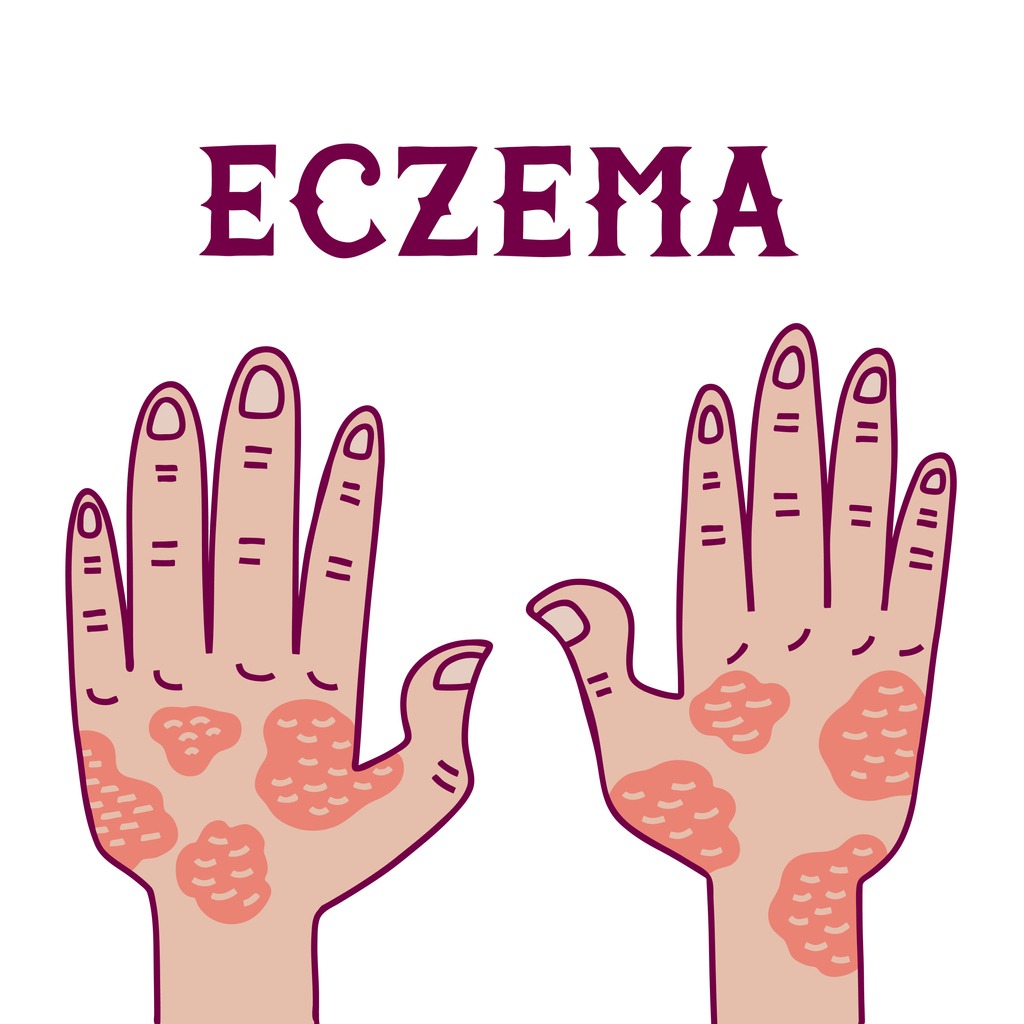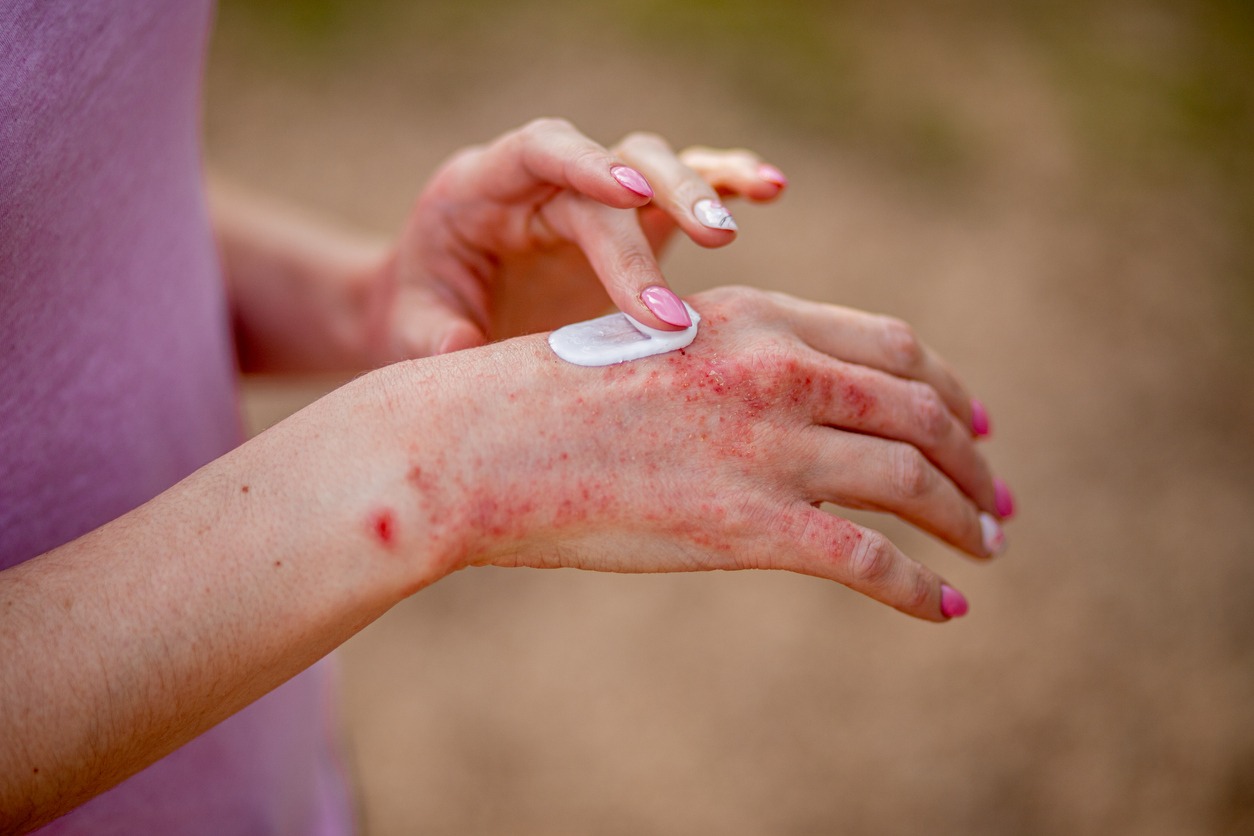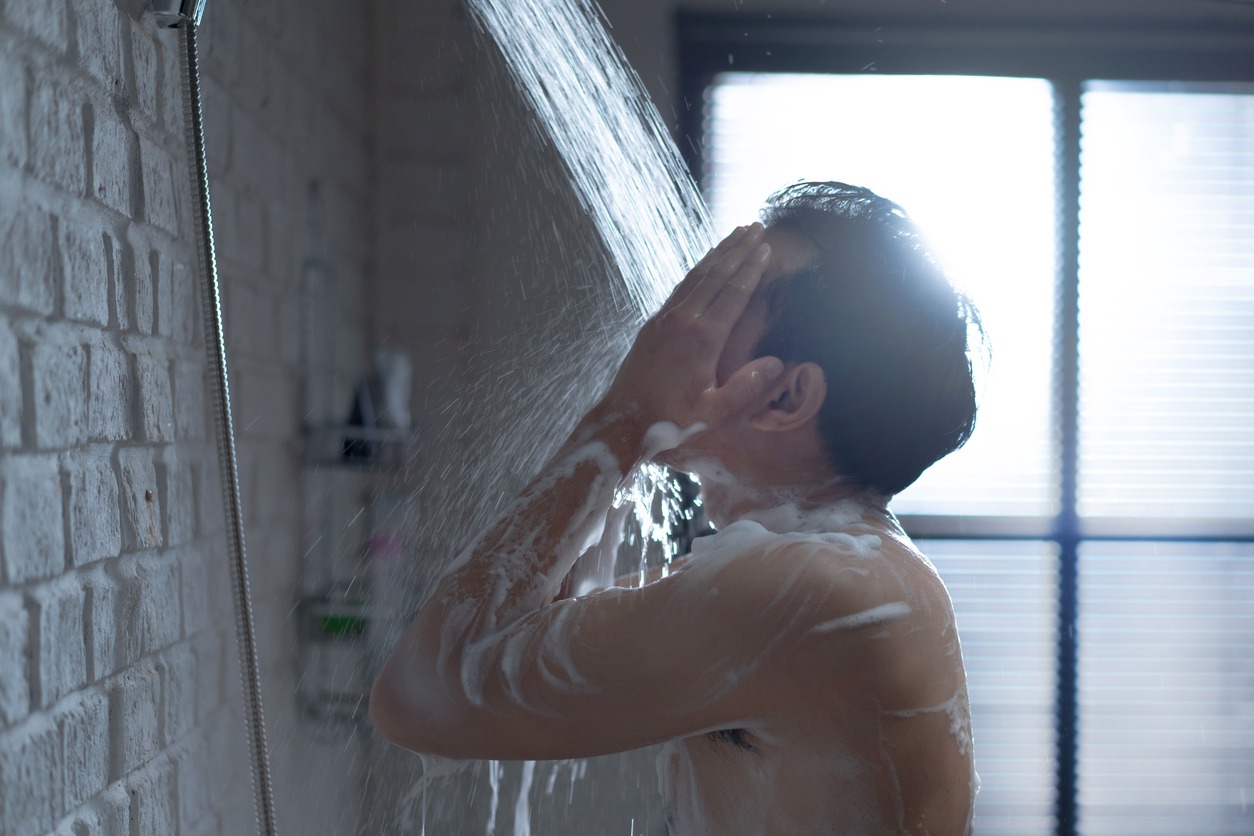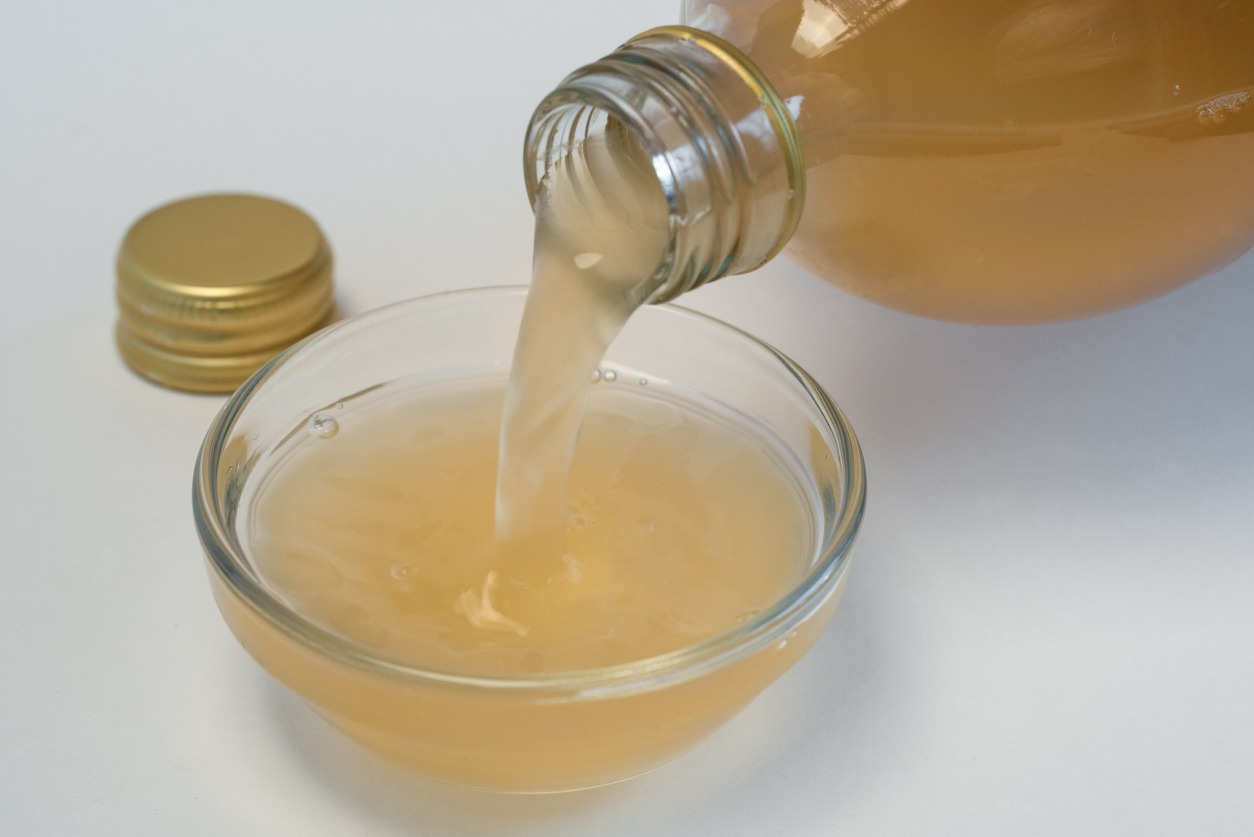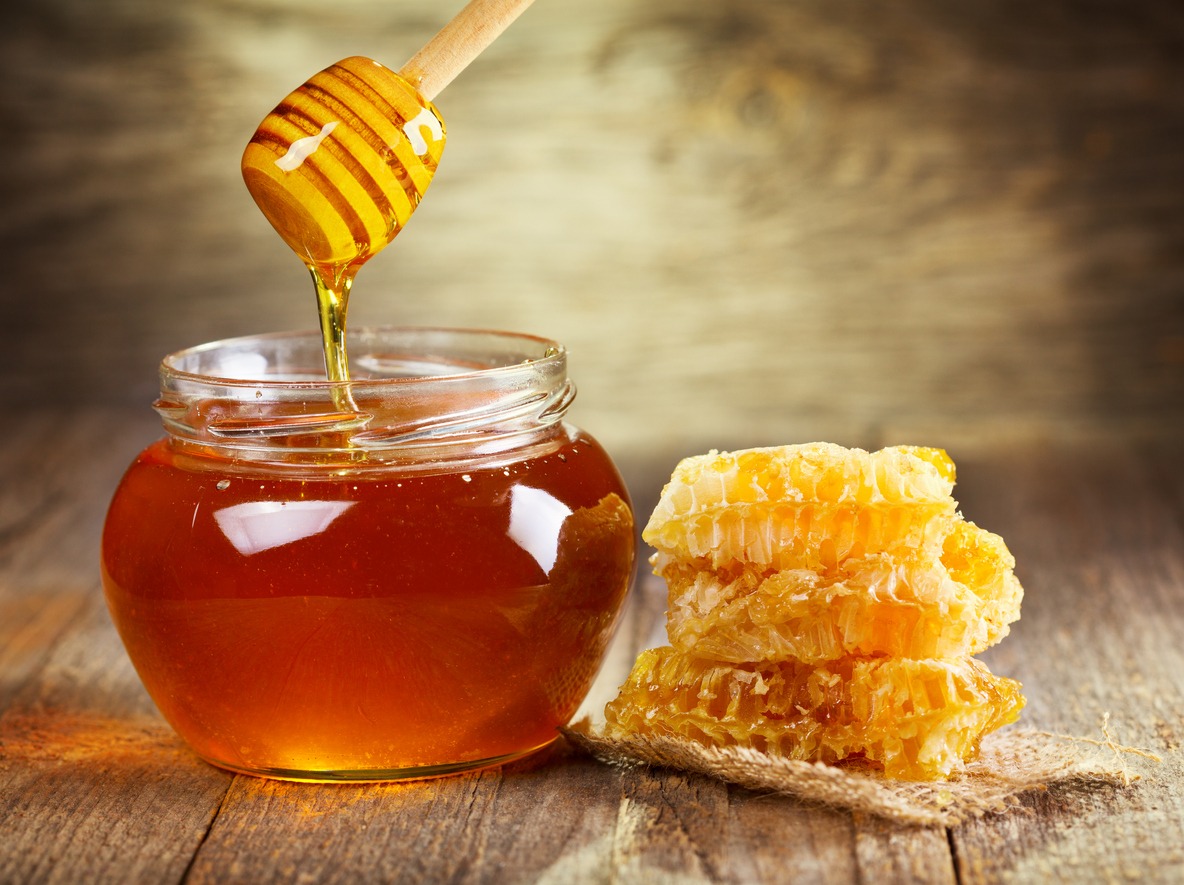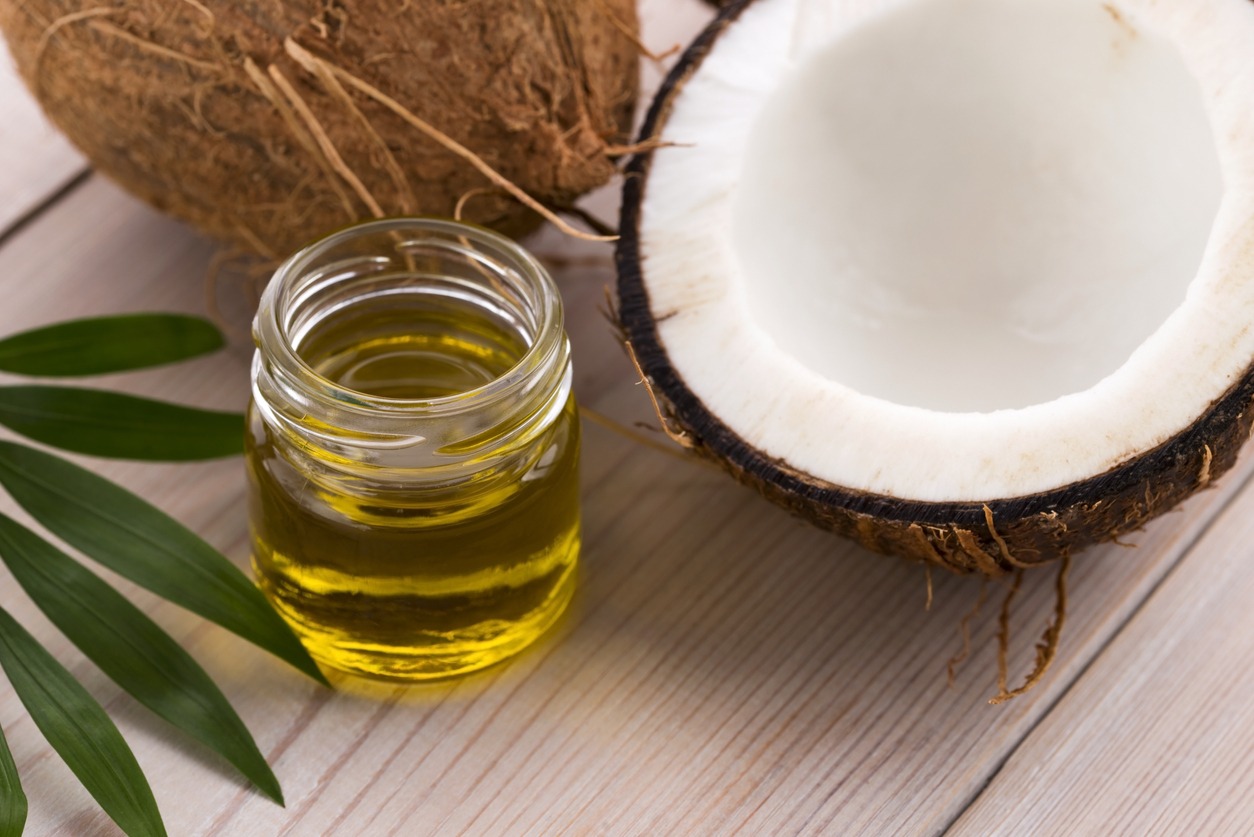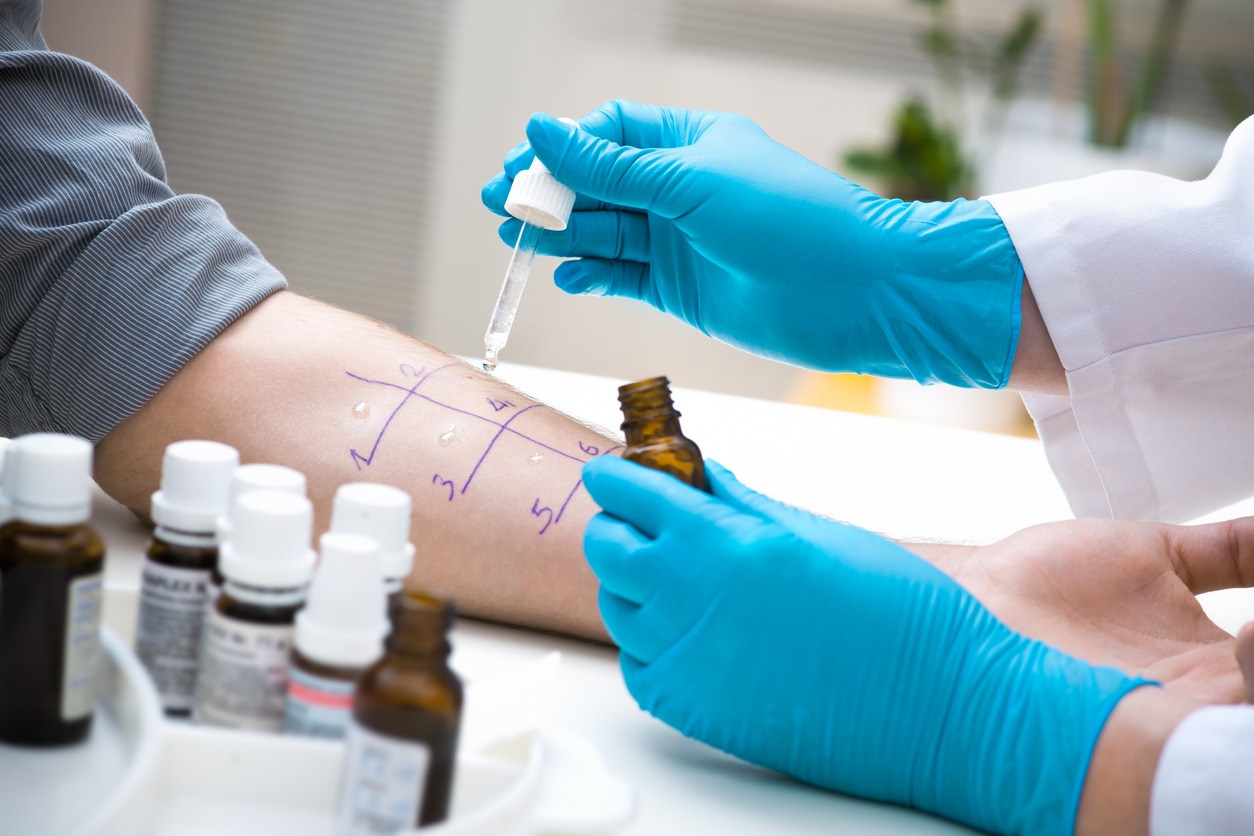Disclaimer: This article is for informational and educational purposes only and does not substitute professional medical advice. It is important to always consult a medical professional for any health issues.
Eczema is a type of skin condition that causes dry and itchy patches of skin. It is among the most common skin conditions that many people experience, but it is not contagious. In fact, it affects over 31 million Americans. The symptoms of this condition may flare up if the person affected comes into contact with an irritant or an allergen. There isn’t a cure for eczema, but there are treatments available that may help in managing the symptoms. [1]
This skin condition can weaken the barrier function of the skin, which is responsible for helping the skin retain its moisture and protect the body from outside elements. Eczema is a type of dermatitis that causes the skin to become dry, itchy, and bumpy. It can affect anyone at any age, and the symptoms mostly appear during childhood and last into adulthood. [1]
If you are one of the many people experiencing eczema and are looking for ways how to manage its symptoms, we are here to help you. In this post, we are giving you some of the best tips for dealing with eczema.
Symptoms of Eczema
Eczema may look different for each person diagnosed with the condition. For instance, if you have a light skin tone, an eczema rash may look pink, red, or purple. On the other hand, if you have a dark skin tone, an eczema rash may appear purple, gray, or brown. Below are the most common symptoms of eczema: [1]
- Dry skin
- Itchy skin
- Skin rash
- Swelling
- Thick, leathery patches of skin
- Bumps on the skin
- Flaky, scaly, or crusty skin
These symptoms may also show up anywhere on the skin. These are the most common parts of the body where you will notice symptoms of eczema: [1]
- Hands
- Elbows
- Feet
- Neck
- Face
- Ankles
- Lips
- In and around ears
- Knees
Aside from these parts, some of the less common parts where symptoms of eczema may appear include breasts, nipples, folds of skin near the vulva, and the penis. Also, eczema does not usually cause pain. However, scratching the skin may break the surface and create a sore, which could become painful. But there are types of eczema that cause discomfort and a burning sensation. [1]
In case your skin condition results in having wounds, you may check out our list of the Best Creams and Salves for Wound Care for some useful tips and recommendations.
Causes of Eczema
There are several factors that may cause eczema. Below are the most common ones:
Immune System
The immune system of people with eczema overreacts to small irritants or allergens in the environment. Your immune system will presume that these irritants are foreign invaders like viruses or germs that could harm the body when you come into contact with a trigger. Therefore, the triggers will activate the natural defense system of your body. The defense of the immune system is to create inflammation, which in turn, causes symptoms of eczema on your skin. [1]
Genes
If there is a history of eczema or dermatitis in your family, you are more likely to have the condition, too. In addition, you can also be at a higher risk if there is a history of asthma, allergies, or hay fever. Some of the common allergies include foods, pet hair, or pollen, which trigger an allergic reaction. Aside from that, you could also have a genetic mutation that may cause the barrier of your skin to not function as it should. [1]
Environment
There are a lot of things in the environment that may irritate the skin. Some examples are exposure to air pollutants, smoke, fabrics like wool, harsh soaps, and skin care products. Aside from that, low humidity or dry air may also cause the skin to become dry and itchy. Also, high humidity and heat cause sweating, which may also make the skin itchy. [1]
Emotional Triggers
The health of your skin may also be affected by your mental health as it may also cause a flare-up of eczema symptoms. If you have high levels of stress or if you have anxiety and depression, you may have more frequent flare-ups of eczema symptoms. [1]
In addition to these, there are other triggers of eczema. However, you must keep in mind that certain triggers for your symptoms may not be present in people with the same illness. To sum it up, below are the common triggers that cause eczema:
- Dry weather
- Fabrics or clothing material
- Skincare products
- Air pollutants
- Soaps and detergents
- Contact with something you are allergic to
- Stress
There are also people who are allergic to foods like peanuts, eggs, and dairy. However, the connection between eczema and food allergies is not clear. But if you have food allergies, avoiding those foods is important to prevent causing or worsening the symptoms of eczema. Also, while eczema can cause the immune system to overreact, it is not classified as an autoimmune disease. It is also not contagious. [1]
Different Types of Eczema
Like other skin conditions, eczema also has different types, and each of them has its own set of symptoms and triggers. Below are the different types of eczema:
Atopic Dermatitis
This is the most common form of eczema. It usually begins in childhood and usually gets milder or goes away by adulthood. It is also part of what healthcare professionals call the “atopic triad.” The two other diseases are hay fever and asthma. A lot of people who have atopic dermatitis have all three conditions. [2]
Atopic dermatitis is the result of a weakened natural barrier of the skin against the elements. This means your skin is weak when it comes to protecting you from allergens and irritants. It is also likely caused by genes, dry skin, an immune system problem, and other triggers in the environment. Below are the symptoms of atopic dermatitis: [2]
- The rash usually forms in the creases of the knees or elbows.
- The skin around the rash may become darker or lighter, or it may get thicker.
- Small bumps may appear on the skin and leak fluid when scratched.
- Most babies get the rash on their cheeks or scalp.
Contact Dermatitis
Another common type of eczema is contact dermatitis. There are two kinds of contact dermatitis, which are allergic and irritant. The immune system reacts to an allergen in allergic contact dermatitis. An irritant contact dermatitis, on the other hand, begins when a chemical or other substance irritates the skin.
When you come into contact with something that irritates your skin or sets off an allergic reaction, contact dermatitis develops. Some of the most common causes of contact dermatitis are detergents, bleach, soaps, perfumes, jewelry, solvents, tobacco smoke, paint, nickel, latex, and poisonous plants. [1] Below are the symptoms of contact dermatitis:
- The skin turns red, itches, and is hyperpigmented or pink, magenta, burns, and stings.
- Itchy bumps, referred to as hives, appear on the skin.
- Fluid-filled blisters form, and they may ooze and crust over.
- The skin may thicken over time and may feel leathery or scaly.
Dyshidrotic Eczema
This type of eczema causes small blisters to form on the hands and feet. It is also more common in women compared to men. Dyshidrotic eczema may be caused by allergies, exposure to substances like nickel, cobalt, or chromium salt, stress, damp hands and feet, and smoking tobacco products. [2] Below are the symptoms of dyshidrotic eczema:
- The skin may scale, crack, and flake.
- Fluid-filled blisters may appear on the fingers, palms, toes, and soles of the feet.
- The blisters on the skin may itch or hurt.
Hand Eczema
This type of eczema only affects the hands. It can be acquired if you work a job, such as hairdressing or cleaning, where you regularly use chemicals that may irritate the skin. People can be more at risk of this type of eczema when their jobs include cleaning, healthcare, hairdressing, and laundry. [2] Below are the common symptoms of hand eczema:
- The hands get red, itchy, dry, and hyperpigmented.
- The hands may form blisters or cracks.
Neurodermatitis
This kind of eczema and atopic dermatitis are extremely similar. The skin develops thick, scaly patches as a result. It usually begins in people who have other types of eczema or psoriasis. The causes of this type of eczema are unknown, but stress is possibly one of the triggers. [2] Below are the symptoms of neurodermatitis:
- Thick, scaly patches of skin may form on the back of the neck, arms, scalp, legs, bottoms of feet, and backs of the hands.
- The patches of skin may be very itchy, particularly if you are asleep or relaxed.
- The patches of skin may bleed and get infected if scratched.
Nummular Eczema
This type of eczema causes round spots to form on the skin, which is the size of a coin. It looks different compared to other types of eczema, and it can be very itchy. It is triggered by a reaction to an insect bite or an allergic reaction to chemicals or metals. Aside from that, it can also be caused by dry skin. You are also more likely to acquire it if you have another type of eczema, like atopic dermatitis. [2] Below are the symptoms of nummular eczema:
- Round, coin-shaped spots on the skin.
- These spots are itchy and may become scaly.
Stasis Dermatitis
This type of eczema occurs when fluid leaks out of weakened veins into the skin. It may cause swelling, redness, itching, and pain. It happens in people who have blood flow problems in their lower legs. If the valves pushing the blood up through the legs toward the heart malfunction, blood may pool in the legs. When this happens, the legs can swell up, and varicose veins may form. [2] Below are the different symptoms of stasis dermatitis:
- The lower part of the legs may swell.
- The legs may ache or feel heavy.
- Varicose veins are present, and they are thick, ropey, and damaged.
- The skin on the varicose veins is dry and itchy.
- Open sores on the lower legs and tops of feet may develop.
Ways to Deal with Eczema
Eczema sufferers are aware of how challenging and annoying it may occasionally be. You must be looking for solutions to dry, itchy skin problems. You’ve certainly tried a number of products, but they just served to irritate and dry up your skin even more.
If you are suffering from eczema, you don’t have to worry, as there are lots of home treatments that you can try, along with prescription medications from your dermatologist, to minimize the discomfort. Eczema treatment at home can range from easy to difficult. Avoiding allergens as much as you can is the first and best form of treatment. Expect a sluggish recovery because home cures sometimes take time to take effect.
Eczema is simpler to manage than to treat. Here are some self-care remedies you can do to lessen skin irritation:
Bathing
Bathing is crucial to the management of eczema. The outermost layer of skin, known as the epidermis, needs additional moisture when a person has eczema because it is unhealthy. Some people’s skin can get drier after washing, which can make their eczema symptoms worse. This typically happens if:
- The water is too cold or hot when bathing.
- You do not moisturize enough after showering.
- You use inappropriate soap.
For most babies and children, bathing once or twice a week is enough. However, for adults, it is recommended to use lukewarm water to shower at least once daily. The minimum amount of time when showering should be 10 minutes. It is important to avoid using harsh soaps as well as regular scrubbing. If you have sensitive skin, it is beneficial to try medicinal baths, which most dermatologists prescribe. After showering, it is important to moisturize your skin immediately. This way, some water will be sealed into your skin before they evaporate.
Relaxation Techniques
Eczema frequently becomes active as a result of stress. It’s because inflammation is brought on by stress. To deal with a stressful situation, try these relaxing techniques. This will consequently slow down skin aging:
- Yoga
- Deep breaths
- Medication
- Stress-relieving therapy
Apple Cider Vinegar
Researchers have discovered that Staphylococcus aureus and Escherichia coli may be combated by apple cider vinegar. Additionally, using apple cider vinegar will keep the damaged skin free from infections. Always dilute apple cider vinegar before applying it topically. If not, it will result in chemical burns or other serious problems. ACV can be applied in baths or wet wraps.
If using in a wet wrap, then the procedure is:
- Mix 1 tablespoon of vinegar into 1 cup of warm water
- Rub the solution with cotton or gauge
- Apply it on the infected area for 3 hours at least
If ACV is used in a bath soak, then the method is as follows:
- In warm water, add 2 cups of vinegar
- Let it soak for 5-20 minutes
- Wash the body from top
Honey
Honey naturally has antibacterial and anti-inflammatory characteristics, which help to treat eczema and atopic dermatitis. A study came to the conclusion that honey is a useful substance for controlling the body’s defense processes. Strengthening the body’s immune system aids in wound healing.
According to studies, honey’s antibacterial properties can aid in the treatment of a variety of medical skin conditions, including burns and wounds. To use honey on the skin, you simply need to spread it onto the affected area. You can let it rest for a whole to get better results of moisturization and fast recovery.
Aloe Vera Gel
Eczema is one of the conditions that have been successfully treated with aloe vera plant leaves. A thorough analysis of the effects of aloe vera on human health published in 2015 came to the conclusion that the gel serves a variety of purposes. Some of these include antibacterial, antimicrobial, and wound recovery. Aloe vera’s wound-healing property is the top reason for its use in the soothing of damaged skin.
To use aloe vera, you need to first test a small amount of gel on your skin to check for skin sensitivity. Ensure that there is no stinging or burning sensation. Also, always look for a gel that contains minimum ingredients. Avoid those that contain alcohol and other drying ingredients that may make the skin drier.
Coconut Oil
A good all-natural moisturizer is coconut oil. The National Eczema Association claims that coconut oil contains antibacterial properties that inhibit the development of staph germs and so prevent infection.
When using coconut oil, always pick virgin coconut oil or cold-processed oil, which is free from chemicals. Based on a study, coconut oil is better compared to mineral oil. Using it for 8 weeks may improve eczema flare-up. To use coconut oil, apply it to your skin after bathing. You can do it several times a day. It is also best to apply it before going to bed to keep the skin moisturized.
Sunflower Oil
A barrier created by sunflower oil prevents moisture from the skin’s surface from evaporating. Additionally, it has an anti-inflammatory effect that lessens eczema stimulants. In cases of hypersensitivity, sunflower oil must not be used. Apply to the skin after taking a shower if no allergic reaction is seen (before the skin fully dries). This will aid in stopping further breakdown.
Dietary Changes
There are some food items that may cause eczema flare-ups in some people. Therefore, it is also important to keep a good check on your diet and see if there are any foods that trigger your symptoms. You may also try incorporating anti-inflammatory foods into your diet to help prevent breakdown. Some of these include fish, beans, lentils, leafy green vegetables, colorful fruits, and cinnamon.
Using Over-The-Counter Creams and Ointments
There are also a lot of creams and ointments that you can purchase over the counter, which may help in alleviating the symptoms of eczema. One of the best examples of this is calendula ointment.
Calendula is an herbal drug that has been utilized as a folk medicine to treat skin burns, abrasions, and inflammations. It is believed to enhance blood flow to the affected surface, which helps restore the skin’s hydration. In addition to that, there are many other topical treatments to choose from, such as anti-itch creams, moisturizing lotions, and more, which can all be purchased over the counter.
If you need more tips and recommendations, you may read our Guide to Selecting Moisturizing Solutions for Your Skin.
When to See a Doctor
If you have eczema, it is important to see your doctor or dermatologist if the itching, redness, dryness, scaliness, and hyperpigmentation you are experiencing do not go away or if these symptoms interfere with your daily activities. Dermatologists can diagnose and help treat eczema flare-ups. [2]
It is also helpful for doctors to understand your condition by keeping a diary to identify your triggers. For instance, you may write down what you eat and drink, the skin products you use, the activities you do, how long you take a bath, and when you are under stress.
You may also visit an allergy specialist for a patch test. It is a kind of skin test in which tiny doses of irritants are administered to regions of your skin. These patches remain on the skin for around 20 to 30 minutes to see if you have a reaction. This test may also help your doctor in determining the substances that trigger your eczema so that you can avoid them. [2]
Doctors may also prescribe you medicines and treatments to get rid of the rash. Some of these include: [2]
- Antihistamines to control the itch
- Corticosteroid creams to reduce the itch
- Calcineurin inhibitors to reduce the immune response that causes itchy skin
- Antibiotics for skin infections
- Lotions or baths with colloidal oatmeal to relieve itching
Conclusion
Although there is no cure for eczema, the severity of symptoms can be controlled with the use of the above-mentioned home treatments, such as apple cider vinegar, bathing, relaxation techniques, honey, and coconut oil.
Simultaneous use of home medication and prescribed medications can help reduce inflammation in mild to moderate cases of eczema. However, it is advisable to contact a doctor as soon as possible if the eczema is severe and does not improve with home remedies. Since topical steroids or antihistamines are required for chronic growth. Most importantly, make sure to consult with your doctor to create a plan that is best suitable for your skin condition.
References
[1] Cleveland Clinic, E. (2022, October 25). Eczema: What it is, symptoms, causes, types & treatment. Cleveland Clinic. Retrieved December 27, 2022, from https://my.clevelandclinic.org/health/diseases/9998-eczema
[2] Watson, S. (2022, January 26). 7 types of eczema: Symptoms, causes, and pictures. Healthline. Retrieved December 27, 2022, from https://www.healthline.com/health/types-of-eczema#1

